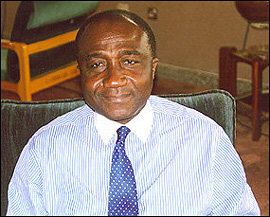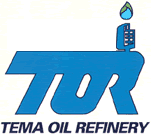
| 

|

Interview with
Mr. Lovelace Prempeh,
Deputy Managing Director (Finance & Adminisrtation)
October 5th 1999
Contact :
P.O.Box 599, TEMA - GHANA
Tel: (233) 22 304 095/7 – 302 881/3
Fax: (233) 22 302 910 - 302 884
E-mail: tor@tor.com.gh
|
Could you please give us a brief historical background of your company?
Tema Oil Refinery was originally called the Ghanaian-Italian Petroleum Company (GHAIP) Ltd. It is a company which was incorporated in Ghana in the early 1960s. we started operations in 1963. The refinery itself was built by Snam Projetti and Nuovo Pignone an Italian group. When it was first built the management was in Italian hands with some Ghanaian employees. The plant capacity was 1.25 million metric tons of crude processing per annum. It is a hydroskimming Refinery, that is to say we have a crude distillation unit which takes the initial crude oil and processes it into various products; LPG, Virgin naphtha which is split into heavy and light naphtha. Then we have the middle distillates, which are kerosene/Aviation turbine kerosene and gas oil; then residual fuel oil. We also have a second plant which is a Reforming Unit. This section takes as its feed stock the heavy naphtha and through a catalytic process we produce what we call a reformate. The reformate gives us a higher octane of about 95 and that is what we use in blending premium gasoline. We use a mixture of the reformate, some heavy naphtha, a bit of light naphtha and lead compound to get our gasoline pool to feed the market. That is basically what the refinery does.
In the earlier 60s it used to be an Italian company, who owns it today?
At that time it was a company which was owned jointly by the Italians and the Government of Ghana. Around about 1977 by mutual agreement between both parties the Ghana government bought the equity holding of the Italians and so from then it became a wholly owned Ghanaian company. At that time the government of the day was trying to ensure that Ghanaians took over the commanding heights of the economy and since then it has become a fully owned Ghanaian company. The management changed eventually to Ghanaian hands. At that time the staff population was well over 700. The name of the company was subsequently changed in 1990 to Tema Oil Refinery (TOR) Ltd, basically to reflect the geographical location of the company.
When you say it is wholly Ghanaian owned, do you mean it is wholly government owned?
It is a company incorporated under the Ghana companies code 1963, Act 179 but the government is the sole shareholder and so we are regarded as a State-Owned Enterprise.
Are you planning to eventually privatize the company?
Yes. The government has indicated that Tema Oil Refinery is slated for privatization. In this respect the Divestiture Implementation Committee has been mandated to put into motion the modalities for the privatization of the company eventually but we do not know yet what shape the privatization will take. We are definitely slated to be privatized.
By when do you think this is going to happen?
It is moving pretty fast and I would think that within the next year or two the privatization process would have been completed.
Who are your main suppliers?
Ghana takes its crude oil mainly from Nigeria because of its geographical proximity. We gain on freight. The Nigerian light sweet crudes suit the configuration of the refinery. The 2 types of crude oil that we take from Nigeria are the Bonny light crude and the Brass river crude oil. The latter gives us more of the light ends of the product i.e. more LPG and more gasoline. The former gives more of gas oil and jet fuel.
Do you have other suppliers than Nigeria?
We rely more on the crude from Nigeria but this Refinery has also experimented with the lion Crude from Cote d’Ivoire. It has also once tried the palanka crude from the Southern part of Africa specifically Angola.
How do you ensure the quality of your products?
We have a good laboratory where we make sure that we get the right specifications for the market. All the airlines that come to Ghana take fuel produced at this refinery and the jet fuel as well as the other products are to international standards.
Who are your main customers?
Our main customers are the Oil Marketing Companies in Ghana, i.e. Shell, Mobil, Elf, Total, Goil and others. The refinery’s aim is to feed the Ghana market. Until 1994 concentration was on the local market, especially in the area of the Liquified Petroleum Gas which has been promoted a lot by the government. We also provide gas oil for the private Emergency power producers, like Cummins and Aggreco as a source of fuelling their plants. We also export residual fuel oil to Europe and North America since our climate is such that we do not need it. Unfortunately, the price of this product is a total give away so we lose on that and it has been decided that we move into secondary conversion. We are going to install a Residual fluid catalytic cracker which will use the residual oil as the feed stock to process for more of the higher value products i.e. LPG, gasoline and some gas oil. The construction work of the first phase of this expansion was done by SK Engineering Company Ltd of Korea. Samsung Corporation provided 85% of the total cost of $65million by way of debt finance and the government of Ghana provided 15% equity. The contracts were signed in September 1994, the installation works started in 1997 and it was completed by the middle of 1998. We are now moving into the second phase, being the installation of the residual fluid catalytic cracker, the RFCC stage.
| The contract cost for that is $185 million, the main contract was signed here in Accra in December, 1998 between Tema Oil Refinery and the consortium of SK Engineering and Samsung. Negotiations for the financing of it were completed this year and in February this year we went to Seoul, Korea to sign the credit agreement with Samsung Corporation for 85% of the cost. The work is in progress and it will take about 3 years to complete and commission. This will increase production and enhance exports. We need to build a Single Buoy Mooring (SBM) mid sea to handle the bigger tankers which will come and take the export products away. There is the need for more storage tanks and all these capital investments will open up the business opportunities for business companies throughout the world to come and invest in the country.
Do you have any relations with America already?
QYes we do. We buy a lot of refinery equipment, spares and chemicals from America and we are open to investments from American companies and investors. Indeed, the new RFCC complex we have talked about is an American Technology, specifically a U.O.P. design. Also, Parsons Energy & Chemical Inc. of U.S.A. are currently undertaking a feasibility study for Cogeneration Plant at TOR.
Can you give us some more figures on your number of staff and your current turnover?
We have about 390 employees now but with the impending expansion we hope to have about 420. The current turnover of the refinery is in the region of approximately 700 billion cedis. In 1997 we made a profit of 18 billion cedis. Unfortunately in 1998 we made a loss due to a lot of factors. We hope to return to healthy profits the year following recent upward price adjustments.
What is your policy on environmental problems?
We are very particular about environmental issues and therefore we have an environmental department. We have what we call a proper method of treating waste water so that the waters do not get contaminated with oil. We are going to upgrade our waste water treatment system under our expansion program to meet the new environmental guidelines which have been set by the Environmental Protection Agency (EPA). We are seriously considering the production of unleaded gasoline for the market and phase out lead.
How do you see the future of your company within the Ghanaian economy and also as far as your export plans are concerned?
Ghana is definitely the Gateway to Africa and the refinery is going to play a pivotal role in this. We see ourselves as the provider of the fuel and petroleum needs of the sub-region. We plan to export some more products to Burkina Faso, Mali and Togo. The opportunities are vast. I can see this refinery growing beyond its present limits.
Could you give us a brief background of yourself, and what would you say has been your greatest achievement?
I am professionally a Chartered Accountant, a member of the English Institute of Chartered Accountants as well as a member of the Ghana Institute. I trained and qualified with Coopers and Lybrand in England. I am also an Economist, having read Economics at the University of Lancaster in England. I returned from England to this country in 1975 and joined the accounting firm of Peat Marwick Mitchell and Co. for 4 years. I did a lot of auditing work with them, auditing the Accounts of Banks, industrial and commercial organizations. Then in 1979 I was made the Finance Director of SCOA which was then a French company and I stayed with them for nearly 10 years and finally ended up at Tema Oil Refinery in May, 1988. I was appointed Deputy Managing Director for Finance and Administration so I have been here for almost 12 years. It has been very exciting since it was my first exposure to the oil industry. I entered the Petrol chemical/engineering world from a financial background and had to learn the language of oil and petroleum. It has been intellectually very rewarding. We have at TOR a very good team under the able leadership of our Chief Executive, Mr. W.S. Parker who has over 40 years experience in the oil industry. It has been during this period that the company’s processing capacity has increased from 1.25 million metric tons processing to 2 million metric tons. We have also achieved this tremendous investment of more than $250 million for the revamping and expansion of the Refinery. During this period we have put in a new sea water-cooling pipeline from the Tema Harbour to the refinery a distance of some six kilometers. We have installed a new 6.5 megawatt generator which has enabled us to continue to produce our own electricity. We have put in 2 LPG spherical storage tanks to meet the increased demand for LPG. We have put emphasis on staff training and development. These have been very great achievements for us.
As you know Forbes Magazine reaches more than 4 million readers, mostly businessmen. What is your final message to them?
I would like businessmen and investors in America and elsewhere to focus on Ghana and the exciting period that Ghana is going through. Our Economic Recovery Program has worked very well, we have improved the GDP growth of this country and maintained it, the infrastructure has improved a lot, road networks and telecommunications have improved. The opportunities are vast for any investor who wants to come to Ghana. The oil industry has a great role to play in the development of Ghana so I do think that anyone investing in this industry will not lose his money. Infact, if there is one area of investment that has growth potential it must be Tema Oil Refinery and the Oil Industry in Ghana.
|
© World INvestment NEws, 1999.
This is the electronic edition of the special country report on Ghana published in Forbes
December 13th 1999 Issue.
Developed by AgenciaE.Tv |
|
|
|
| | | | | |
|

